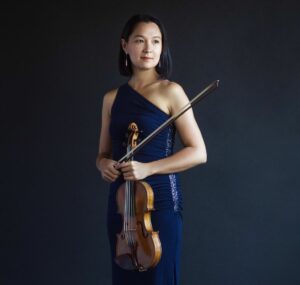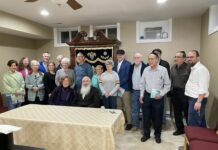Through its Shir Shabbat services, Chizuk Amuno Congregation adds a celebratory musical component to the Jewish day of rest.

Typically held once or twice a month on Fridays, Shir Shabbat incorporates a band of Chizuk Amuno congregants to provide musical flair to traditional Shabbat prayers, encouraging attendees of all ages to dance and sing along.
Musical Shabbat services at the synagogue date back to 2014, at which time they were viewed as being fairly experimental for the Conservative congregation. In the beginning, the synagogue would test the waters by integrating a guitarist into services. Starting in 2017, Chizuk Amuno leadership made a commitment to start holding Shir Shabbat services regularly because of how well received they had been.
“Musical services were deemed to be a needed option for people who want something different from the standard Conservative synagogue service on Saturday morning,” said Bob Hallock, Chizuk Amuno’s president. Hallock is part of the Shir Shabbat Band and plays the keyboard during services.
“It’s usually a one-hour service where people can let their hair down and have a joyful Shabbat experience,” he added. “Sometimes there’s dancing in the room, and we pass out egg shakers to all the little kids. There’s a lot of audience involvement.”
Shir Shabbat services are also streamed online on Chizuk Amuno’s website, so people can join in even if they are sick or otherwise unable to attend in-person.
“The Conservative movement is a little bit more new to the world of live instruments and live instrumentation in a Shabbat setting,” said Meira Silverstein, a Chizuk Amuno board of trustees member and one of the musicians in the Shir Shabbat Band. Silverstein is a professional violinist who often plays with the Baltimore Symphony Orchestra.
Band members contribute a variety of different instruments to the service. In addition to several vocalists, the band consists of pianists, guitarists, percussionists and even musicians who play less common instruments like the mandolin.
When the Shir Shabbat Band was first formed, it consisted entirely of adult congregants. But Hallock estimates that about five or six years ago, teenage congregants began to show interest in joining the band.
These teenage musicians help provide a new, youthful energy to the band’s accompaniment in Shir Shabbat services. They also act as role models to child congregants.
“We are at a point where young kids look up to these teenagers and tell their parents that when they’re a teenager, they want to be in the band, which is amazing,” Hallock noted.
The Shir Shabbat Band is a staple of the synagogue’s musical services, but the band also sometimes feature musical guests versed in Jewish music. Recent services have featured Rabbi Ben Shalva, who is involved with The Soul Center, and Rabbi Josh Warshawsky, who writes his own music and tours the country as a musician in addition to his work as a rabbi.
Warshawsky joined Chizuk Amuno for its Song and Spirit service series. For Silverstein, this was particularly memorable, as she had the opportunity to work with him.
“He’s a really wonderful musician,” she said. “He brought his own tunes, and would not only teach the singing parts to congregants, but help the musicians as well. He’s really an educator at heart, and it was so exciting to play with him.”
Warshawsky will be returning for the synagogue’s next Shir Shabbat service on Friday, March 29. In addition to the service, attendees can join Warshawsky and the Chizuk Amuno community at a community Shabbat dinner that will take place afterward.
Musical services help congregants to feel more involved in observing Shabbat, and help them take a more participatory role in their synagogue, Silverstein said.
“There’s a natural tension with concert performances, where you hear an instrument and just listen, versus the communal experience of singing and dancing together,” Silverstein said. “Our goal is to create a feeling that everyone can tap into. It’s in part joyous, in part community-oriented and in part participatory. … It’s poignant to share a space together and experience Shabbat together.”







